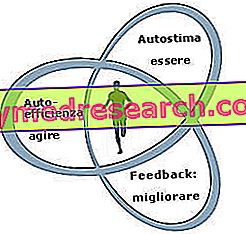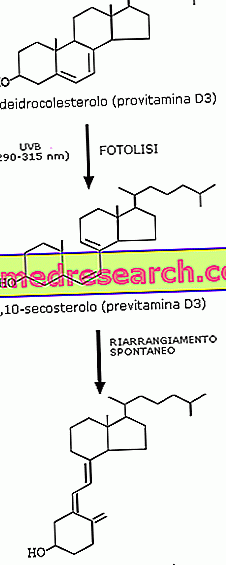
Feedback: improve
When you play sports you have a natural tendency to observe yourself more to see if you improve physically or in your own performances. Often more attention prevails towards error, imperfection, skipped series, the day we did not train, the non-lost oily or the cellulite that does not disappear, rather than the one towards the results achieved: the best health, the absence of breath when you climb the stairs, the 5 series made or 10 training sessions in a row not skipped.

The art of feedback comes to our aid. Three tips that can teach us to turn criticisms into nourishment for our growth in terms of self-efficacy.
First, when you feel that it is time for the "showdown" instead of starting in the fourth, telling you everything you are doing wrong, concentrate for a moment to tell you first how much you are doing and / or have done up to that point. The first few times will be difficult, but then you will see that it will be easy to learn to recognize the other side of the apple and tell yourself how good you have been up to that point.
Secondly, tell yourself clearly and precisely what was wrong or what you were less efficient than hoped for. At this stage it is important that you be precise, only in this way what we commonly call error can become learning.
Finally, do not close with a bitter taste in your mouth but, taking up phase one, learn to emphasize again the good results achieved so far.
I give you a personal example, I ride my bike for passion. Sometimes it happens to me to skip a workout or to work listlessly. The first thing I do is to see how long I go out regularly and train well, then I start looking for the reasons for the lack of training and low performance; in this phase, instead of throwing myself down, I go in search of the true causes and I don't stop at answers like time, sleep, I don't want to; I try to understand if I'm resting badly, if I'm eating too much or too little, or if I need to disconnect or simply change the workout. Finally, I remember all the times that I stopped and started with more strength and desire to pedal, and I tell myself that in the end, if I have always resumed, this time it will be like this, it is enough just to find the right "spring". This allows me to understand the real reasons for the loss of performance while respecting my self-esteem.
Are you still not convinced that the mistakes made and missed training can help you improve? Then simply ask yourself a question: "What did I learn from this error?" If we do not make a mistake we do not have the possibility to learn: remember it!
Conclusion
Today we have learned three important new concepts: self-esteem, self-efficacy and feedback. Now, as good sportsmen accustomed to action, I suggest you bring them into your life. Feel your self-esteem and live it to the fullest: remember that your self-esteem must be high and constant throughout your life and that no one can ever tell you how much you are worth as men, but only estimate how much your actions and your sporting actions are worth. This also applies to ourselves, learning to concentrate and measure our actions instead of us as people. Once this concept is clarified, you can focus on your self-efficacy. The advice is to measure your performance with constancy and attention, knowing that there will be ups and downs, areas where you will be more efficient and areas where you will be less efficient. Once you have observed the ups and downs of your sporting efficiency, all you have to do is engage in the art of feedback. Think of the feedback as a pill you need to improve. The initial and final layers will be sweet as you need them to take stock of the situation on how good you have been up to that point. The center may be bitter but like all tablets it will help you feel better. Remember, in fact, that the best athlete is not the one who makes the least mistake but the one who learns the most from his mistakes.
Bibliography



